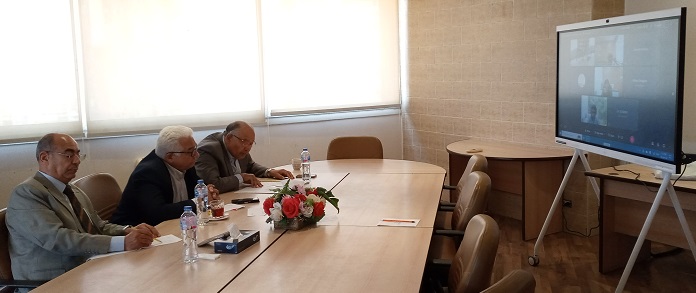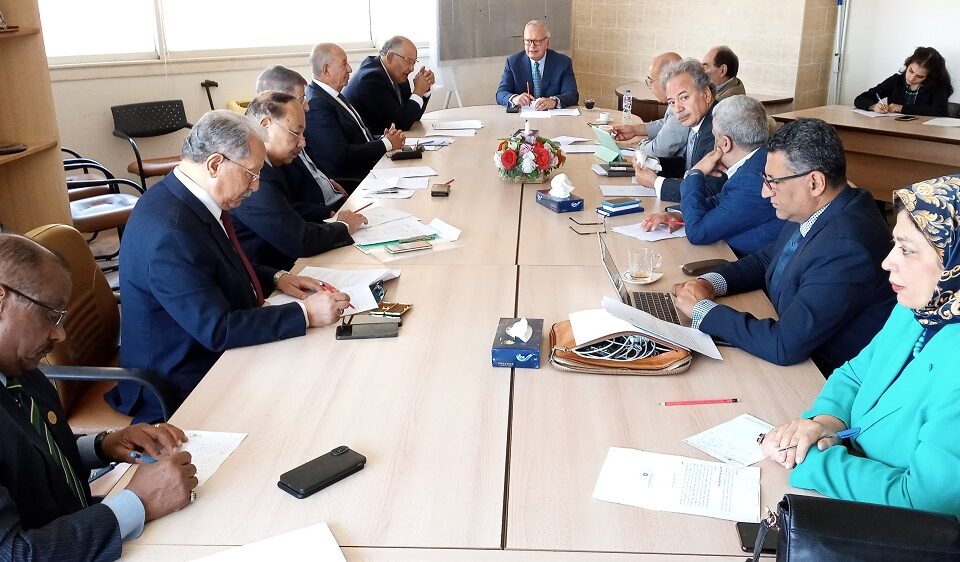Meeting with Assistant Foreign Minister for American Affairs
March 4, 2021Visit by ECFA delegation to the Egyptian Space Agency
March 17, 2021
On March 9, 2021, the Egyptian Council for Foreign Affairs held a closed panel discussion on “U.S. foreign policy towards the world, its expected approach to the Middle East and perceptions of its relations with Egypt“, inaugurated by Ambassador Dr. Mounir Zahran, ECFA Chairman, and attended by Ambassadors/ Ezzat Saad, ECFA Director, Hussein Hassouna, Muhammad Tawfiq, Mohamed Badr Al-Din Zayed, Hossam Zaki, as well as Prof. Ahmed Youssef Ahmed, Prof. Mohamed Kamal, Prof. Mohamed Kassem, and Mr. Atef Al-Ghamry.
The participants indicated that the main task of the new U.S. administration is to repair what Trump damaged during his four-year term at the international level, in addition to addressing some urgent domestic issues such as the Covid-19 pandemic.
One of the main features of the new administration is its growing adherence to the issues of democracy and human rights, as well as taking a very hard line on China and Russia in particular, with the adoption of the idea of a “foreign policy for the middle-class”, serving the country’s internal issues. Generally-speaking, it is expected that the U.S. relations with other countries will be “compound”, i.e., to include manifestations of cooperation and rivalry at the same time. Accordingly, cooperative relations are envisaged between the United States and China or Russia, for example, despite the declared US positions on human rights and democracy…etc. It should be noted here that the United States will not be able to dispense with its traditional allies, including the Europeans, in its policies to contain both China and Russia.
As for the Middle East, there has already been much speculation about the region’s importance to recent U.S. administrations. Some have attributed the reluctance of the new U.S. administration to adopt clear policies vis-à-vis the Middle East till present, to the fact that its members are well-versed in the region’s issues, and because the Trump Administration’s policies and the accumulation of previous administrations have resulted in excessive complications in the region’s files and issues, which requires prudence, especially since the new administration’s interest in the issue of human rights dictates that, as this issue affects many countries in the region. Concerning the Palestinian cause, there is no doubt that the new U.S. administration will continue its unconditional support for Israel, help it integrate in the Arab world, and complete the Abraham Accords initiated by the previous administration. As for the Egypt-U.S. relations, they will also be compound in the general context of U.S. foreign policy, as they will not be governed by a single perspective.
In this regard, efforts should be exerted towards reformulating the discourse on the human rights file, working to attract the American business sector to Egypt, and presenting comprehensive initiatives for the region’s issues and crises, as well as seeking to reshape Egypt’s image among American citizens, and to change the traditional concepts that exist in the bilateral relations between the two countries, by conducting mutual visits and meetings at both the official and unofficial levels.






